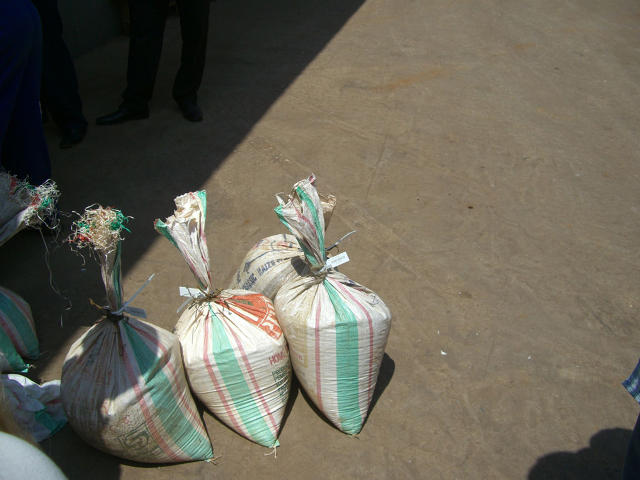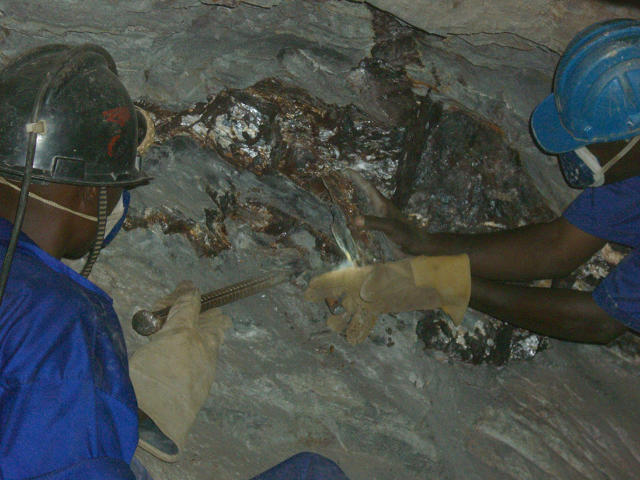In 2016, Intel's Entire Supply Chain Will Be Conflict-Free
Buying electronics used to help fund war in Africa. Now big tech companies like Intel are working to make sure their money isn't used for destruction.
Seven years ago, if you bought a new iPhone or a laptop, you were probably also inadvertently supporting warlords and mass rapists in the Democratic Republic of Congo. The country has some of the world's largest deposits of many of the tiny bits of metal, like tin and tungsten, that make up electronics, and they often came from mines whose profits were used to fund the country's ongoing, devastating civil war. Luckily, that's starting to change.
This year, Intel expects its entire supply chain to be conflict-free. It's taken time: the company first set the goal in 2009, and with a massive list of suppliers, it was an overwhelming challenge at first. "We said, we don't want to support conflict, period," says Carolyn Duran, a director at Intel who oversees supply chain sustainability. "How to do that? Nothing was determined."

It started with its own factories, and worked with a handful of other electronic manufacturers to figure out a way to track materials. Metals mined in Africa might first end up in China or Russia, and before companies like Intel started asking questions, it was hard—or impossible—to say where the metals had originated or whether the proceeds had ended up in the hands of warlords.
Now, nonprofits work with the government to audit mines, and when a mine gets a "green" or good rating, the material that's shipped out ends up in labeled bags that can be tracked to smelting plants around the world. While it isn't a foolproof process, after auditing the mines themselves, Intel believes it works.
"Without owning the mines ourselves we can't be sure 100%, all the time, every day, but if we waited for that we'd never be sourcing from the region at all, and that's not what our intent was," says Duran. "We want to maintain a presence in the region, source responsibly, and help the people on the ground."
Since Intel and other manufacturers began the program, the profits from mines have started flowing to miners themselves rather than to war. In the last study of three of the major materials—tungsten, tantalum, and tin—a nonprofit called the Enough Project found that the amount of money going to conflict had dropped 65%, and it continues to fall.
For tantalum, a blue-gray mineral used in most electronics, almost the entire supply chain is now conflict-free. "There are literally a handful of smelters that aren't there [in terms of verifying that they get material only from conflict-free mines]," Duran says. "And once you hit that inflection point, it's better for the smelters to be in than out. They're actually the outliers now if they're the one or two in the world that aren't going in, it becomes a problem for them from a business perspective."

There are still challenges. Gold, for example, comes out of the ground in chunks that are more pure, which makes it easier to smuggle, since you can just slip a small amount in your pocket and then change it for money. For now, that means Intel has to buy gold from other parts of the world, or recycled gold, in order to know that the materials are responsibly sourced. But it's also still working on a process to help the Democratic Republic of Congo track its own supply. Just stopping buying from the country isn't that great a solution either: Duran points out that mining is one of the country's only legitimate sources of income, and an important step in development.
Making sure that every supplier meets standards is also an ongoing challenge—if Intel gets a new supplier, or buys a new company, the process starts again. But the company is now nearly at a point where it can say everything it makes is conflict-free.
Two years ago, it took the first major step, and announced that its microprocessors were conflict-free, something that helped inspire other manufacturers.
"That helped other companies say 'Hey, yeah, this can be done,'" says Duran. "We had more industries working together and that gave us more traction than Intel working on its own. Some of these smelters are very small parts of our supply chain. But when you have 10 or 20 companies, or two or three industries all setting those same expectations, then it becomes a real solid business case for those smelters and those suppliers to come along and join with us."
The company wants to help the whole global supply chain for these materials—not just its own—become conflict-free. "If every smelter in the world stood up and demonstrated they were sourcing responsibly, there would be no path for the illegitimate materials to go," she says. "You can put up the walls around our own supply chain and say as long as ours is good we're good, but that's not really fixing the fundamental problem. It takes all of us to really fix the problem on the ground."
No comments:
Post a Comment